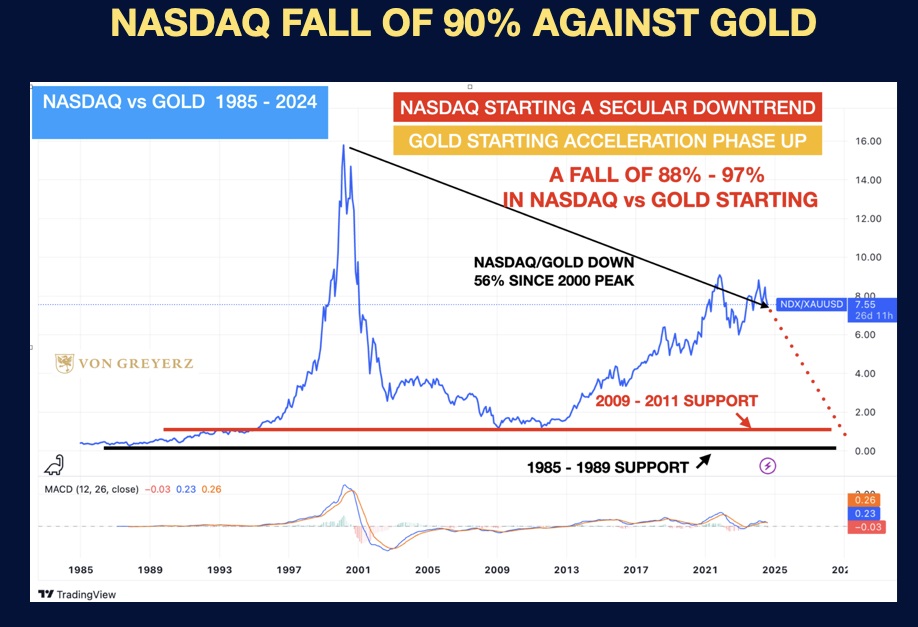The Evil Cycles Of War And Economic Destruction
As we approach what usually should be a blissful holiday period, the treacherous path the world is now on does not bode well for 2025 and beyond.
Two global crises will dominate the world for at least several years and possibly decades.
FINANCIAL CRISIS
The crisis I have been discussing and writing about for many years is the end of the current monetary era, especially in the West. The exponential growth of debt, which we have experienced since 1971 when Nixon closed the gold window, is reaching an uber-exponential phase in the current century with runaway deficits and debt.
The likely course of events is unlimited money printing to counter an uncontrollable debt crisis. This leads to monetary debasement, high inflation or hyperinflation, which eventually turns into a deflationary collapse of the financial system and depression.
THERE CAN BE NO CLEARER SIGN OF THE END OF AN ECONOMIC ERA THAN WHEN THE RESERVE CURRENCY DECLINES BY 99%.
A possible alternative would be that the financial system implodes before the money printing has taken effect, with a subsequent deflationary implosion. This would mean a period without functioning banks and money.
As this is the way every monetary system has ended in history, without fail, anyone questioning this inevitable outcome will be entirely wrong. It is only a question of when, not if.
As the Austrian economist von Mises said:
As always in history, an economic crisis always goes hand in hand with political or geopolitical turmoil.
When a country spends money it doesn’t have, starting a war is the most convenient way of creating new paper money, which, of course, has ZERO intrinsic value.
Expanding credit or printing money does not create economic value, but buys time.
Money printing also buys votes. Reelection is the primary objective of any government in a democratic system.
Consecutive US governments have increased US Federal debt almost every year since the early 1930s.
The current deficit is over $2 trillion, and tax revenue is only $5 trillion. With over $7 trillion in federal spending, the US government needs to borrow another 40% on top ($2T) to make ends meet.
I created the graph below in November 2016, when Trump was elected the 45th President of the United States. I forecast that 8 years later (whoever was president), the debt that Trump inherited ($20 trillion) would be $40 trillion in early 2025. I based the forecast on a simple extrapolation. Since 1981, US debt has, on average, doubled every 8 years. Well, the debt will probably not reach $40T by 20 January 2025, but still, it went up by $16T rather than the $20T that I forecast.
More importantly, as the graph below shows, debt has increased 44X since 1981, but tax revenue has only increased 6X to $4.9T.
Can anyone explain how this debt will be repaid? The standard reply is that governments don’t need to repay their debt.
Well, let me again cite history, which is such a useful empirical tool.
Throughout history, a country which has not repaid its debts has, without fail, always defaulted, and the currency has gone to ZERO.
No one must believe that it will be different this time!
A monetary crisis at the end of a major cycle leads to economic collapse, poverty and misery.
However, this current financial cycle is already developing in parallel with a geopolitical crisis of a magnitude and scale that could be greater than those of WWI and WWII.
GEOPOLITICAL CRISIS
The financial and geopolitical conflicts are clearly linked. As in many armed conflicts, the US has been involved since WWII, although the country is not directly threatened.
This has been the case in Vietnam, Afghanistan, Iraq, Libya, Syria and Ukraine.
Most of these wars are about fear of losing the US hegemony. The US government subscribes to the 1904 Mackinder theory that whoever controls the Heartland controls the world. The Heartland is the area of Eastern Europe stretching to the Yangtze River in the east and the Himalayas in the south. This area has massive natural resources.
Syria probably just fell to opposition groups backed by Turkey in an attack supported by the US military. Interestingly, the latest conflict started the same day as the ceasefire between Israel and Lebanon. Clearly, it’s not a coincidence.
So Turkey, which for a while has ridden two horses, a Russian and an American, has now taken the US side.
Turkey is a NATO member and also a prospective BRICS member, among others, Russia, China, Iran and India.
With Turkey now on the US side and against Russia, we see the first military conflict between the West and BRICS.
Nobody knows if Syria will regroup again with Assad in Moscow and the soldiers deserting the army. For the Russia – Iran axis, Syria is strategically critical. But Russia cannot win that war with just air power and most probably does not want to divert resources from Ukraine.
Thus, we now have yet another crisis in the Middle East, a situation with dire consequences for the area and the world.
So we are likely to see continued war in Syria, with anarchy and the rise of more jihadist groups.
As Thanassis Cambanis, a senior fellow at the Century Foundation, said: “In the best case scenario, Syria’s factions will struggle for primacy through contained local battles. At the other extreme, the collapse will spur a renewed period of total warfare in which factions target civilians.”
So, it is likely that more Syrian people will be homeless and migrate to Europe and the US. As we know, no Western country has the capacity to take care of these people, so again, another humanitarian catastrophe has hit the world.
Losing access to Syria and the Mediterranean has weakened Iran, which will look for other options. The danger has always been that Iran blocks the Strait of Hormuz, which would lock in 24% of global oil. The US could not stop this. It would lead to oil prices at least doubling or more and a major global depression.
The UAE (United Arab Emirates), which includes Dubai, is right by the Strait of Hormuz.
Personally, I have always been surprised that so many people move to and invest in Dubai, given the major geopolitical risk that this area carries.
The world is in a severe war cycle, which, at best, will include insoluble and intractable wars in the Middle East and Eastern Europe with both the US and Russia involved. And at worst, a nuclear war.
I was always of the opinion that the Ukrainian conflict is a war Russia is very unlikely to lose. And neither the US nor European NATO troops have sufficient resources to win a war with boots on the ground.
Russian missiles are currently superior, but anything can happen in a nuclear conflict.
In a nuclear war, there is no winner, and that could be the end of the world, so it is not worth speculating about the outcome of such a war.
THE TRIUMPH OF DEATH
Peter Bruegel painted the “Triumph of Death” in 1562.
Currently, the world, and especially the West, is on a path to geopolitical and economic destruction.
No one knows how this will end. Even if it takes years, the world is unlikely to be the same once these two cycles have run their course.
I have already stated that the end of the current economic cycle will be devastating for the world but bearable relative to the worst outcome of the war cycle.
I had a hope that Trump would settle the Ukrainian situation if the US Neocons didn’t manage to escalate it severely before January 20.
However, the Middle East conflict, with Iran involved, makes the situation much more complex, even with Trump’s best intentions.
I always believe in finding solutions, but it is hard to be optimistic when the two Cycles of Evil prevail so strongly.
At least anyone who has savings should take action to protect these against the coming implosion of financial assets.
MARKETS
Stocks in the US are massively overvalued.
The Buffett Indicator, US Stocks to GDP, is at 208%, an all-time high.
Just a normal correction would be a 50% to 75% fall.
The Price Earnings Ratio of Nasdaq stocks is 49X.
A decline of at least 80%, like in the early 2000s, is likely.
Obviously, bubbles can always grow bigger before they implode.
However, the risk of a market collapse sometime in the next few months is extremely high.
Inflation will rise rapidly, as will interest rates, driven by money printing.
The US 10-year treasury will greatly exceed 10%, as in the 1970s.
WEALTH PRESERVATION
Finally, gold will continue to reflect the destruction of the dollar and most currencies.
Gold in US dollars is up 10X in this century. It is likely to rise by multiples from here as money dies. I explain why in this article: THE CASE FOR GOLD IS INCONTROVERTIBLE.
Gold must be held in physical form and outside the financial system with direct access to your gold. And preferably in a safe jurisdiction outside your country of residence.
Finally, especially in periods of crisis, helping others and having a close circle of family and friends is more important than all the gold in the world.
Courtesy of VonGreyerz.gold
********













 Egon von Greyerz – Founder and Managing Partner of Matterhorn Asset Management (MAM) and
Egon von Greyerz – Founder and Managing Partner of Matterhorn Asset Management (MAM) and 









